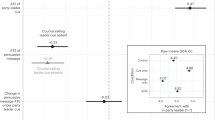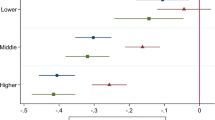Abstract
It has often been argued that the communication strategies used by right-wing populists are key to their appeal to voters. However, prior studies found only rather limited across-the-board effects of communication strategies that employ a populist style and rhetoric. In this study, we focus on the conditionality of the effects of these two communication strategies on the perceived legitimacy of one right-wing populist and one mainstream leader. We use an experimental setup with a large-N representative sample of Dutch voters (n=3125). The results show that the effects of populist communication strategies differ for the lower educated and the politically cynical. These groups of voters are more susceptible to persuasion by the populist style of the right-wing populist party leader. Results are discussed in the light of research on (right-wing) populism.


Similar content being viewed by others
Notes
The authors would like to thank the MESS (Measurement and Experimentation in the Social Sciences) project for the acceptance of the research proposal, for their valuable comments, and for providing the data.
A previous version of this article can be found in [Bos, 2012]. In this article, an additional dependent variable regarding the perceived effectiveness (that is, the extent to which a politician is perceived to be influential) of the politician is included. It also tests an additional communication strategy, namely, ‘authoritativeness’, which refers to how knowledgeable a politician appears to be about the topics discussed.
Some authors mention a third aspect of the populist rhetoric: exclusionism. This element is not included in this study, because it is not an element of populist rhetoric per se, but it is typical for radical right-wing populists. This conceptualization has also been labelled ‘thick’ populism (Jagers and Walgrave, 2007).
These response rates were computed according to the AAPOR-guidelines (AAPOR RR1).
The data were collected in February 2011.
Dependent upon the condition.
We have also tested whether the experimental groups differ with regard to their support for a new nuclear power station, but the F-test is non-significant (F(73 095)=1.369, P=0.214).
F(3492) varies from 6.057 to 80.786, P=0.000.
That we do not find significant marginal effects of populist style on the perceived legitimacy of Blok for the people that are on the extreme low end of the political cynicism scale is caused by the fact that there are almost no observations on this end of the scale: only 5 per cent of the respondents scores 0–1.5 on the political cynicism scale.
References
Albertazzi, D. (2007) Addressing the people: A comparative study of the Lega Nord's and Lega dei Ticinesi's political rhetoric and styles of propaganda. Modern Italy 12 (3): 327–347.
Albertazzi, D. and McDonnell, D. (2008) Twenty-First Century Populism: The Spectre of Western European Democracy. Basingstoke, UK: Palgrave Macmillan.
Arceneaux, K. (2010) The benefits of experimental methods for the study of campaign effects. Political Communication 27 (2): 199–215.
Barabas, J. and Jerit, J. (2010) Are survey experiments externally valid? American Political Science Review 104 (2): 226–242.
Betz, H.-G. (1994) Radical Right-Wing Populism in Western Europe. London: Macmillan.
Boomgaarden, H.G. and Vliegenthart, R. (2007) Explaining the rise of anti-immigrant parties: The role of news media content. Electoral Studies 26 (2): 404–417.
Bos, L. and Van der Brug, W . (2010) Public images of leaders of anti-immigration parties: Perceptions of legitimacy and effectiveness. Party Politics 16 (6): 777–799.
Bos, L., Van der Brug, W. and de Vreese, C. H . (2010) Media coverage of right-wing populist leaders: The role of the media. Communications: The European Journal of Communication Research 35 (2): 141–163.
Bos, L., Van der Brug, W . and de Vreese, C. H . (2011) How the media shape perceptions of right-wing populist leaders. Political Communication 28 (2): 182–206.
Bos, L. (2012) Public images of right-wing populist leaders: The role of the media. Doctoral Dissertation, 8 May. UvA Universiteit van Amsterdam.
Brambor, T., Roberts Clark, W. and Golder, M. (2006) Understanding interaction models: Improving empirical analyses. Political Analysis 14 (1): 63–82.
Carter, E. (2005) The Extreme Right in Western Europe: Success Or Failure? Manchester, UK: Manchester University Press.
Druckman, J.N., Green, D.P., Kuklinski, J.H. and Lupia, A. (2006) The growth and development of experimental research in political science. American Political Science Review 100 (4): 627–635.
Gaines, B.J., Kuklinski, J.H. and Quirk, P.J. (2007) The logic of the survey experiment reexamined. Political Analysis 15 (1): 1–20.
Hawkins, K.A. (2009) Is Chavez populist? Measuring populist discourse in comparative perspective. Comparative Political Studies 42 (8): 1040–1067.
Jagers, J. and Walgrave, S. (2007) Populism as political communication style: An empirical study of political parties’ discourse in Belgium. European Journal of Political Research 46 (3): 319–345.
Knigge, P. (1998) The ecological correlates of right-wing extremism in Western Europe. European Journal of Political Research 34 (2): 249–279.
Koopmans, R. and Muis, J. (2009) The rise of right-wing populist Pim Fortuyn in the Netherlands: A discursive opportunity approach. European Journal of Political Research 48 (5): 642–664.
Lecheler, S., de Vreese, C. and Slothuus, R. (2009) Issue importance as a moderator of framing effects. Communication Research 36 (3): 400–425.
Lubbers, M. and Scheepers, P. (2000) Individual and contextual characteristics of the German extreme right-wing vote in the 1990s: A test of complementary theories. European Journal of Political Research 38 (1): 63–94.
Lubbers, M. and Scheepers, P. (2001) Explaining the trend in extreme right-wing voting: Germany 1989–1998. European Sociological Review 17 (4): 431–449.
Mazzoleni, G., Stewart, J. and Horsfield, B. (2003) The Media and Neo-Populism; A Contemporary Comparative Analysis. Westport, CT: Praeger.
McDermott, R. (2002) Experimental methodology in political science. Political Analysis 10 (4): 325–342.
Mudde, C. (2004) The populist zeitgeist. Government and Opposition 39 (3): 542–564.
Mudde, C. (2007) Populist Radical Right Parties in Europe. Cambridge, UK: Cambridge University Press.
Norris, P. (2005) Radical Right: Voters and Parties in the Regulated Market. New York: Cambridge University Press.
Schedler, A. (1996) Anti-political establishment parties. Party Politics 2 (3): 291–312.
Stewart, J., Mazzoleni, G. and Horsfield, B. (eds.) (2003) Conclusion: Power to the media managers. In: The Media and Neo-Populism: A Contemporary Comparative Analysis. Westport, CT: Praeger, pp. 217–237.
Taggart, P. (2000) Populism. Buckingham, UK: Open University Press.
Van der Brug, W., Fennema, M. and Tillie, J. (2005) Why some anti-immigrant parties fail and others succeed: A two-step model of aggregate electoral support. Comparative Political Studies 38 (5): 537–573.
Van der Brug, W. and Mughan, A. (2007) Charisma, leader effects and support for right-wing populist parties. Party Politics 13 (1): 29–51.
Weyland, K. (2001) Clarifying a contested concept: Populism in the study of Latin American politics. Comparative Politics 34 (1): 1–22.
Author information
Authors and Affiliations
Corresponding author
Additional information
Correction
This paper was originally published with the in text citations not matching the reference list.
Supplementary Information accompanies on Acta Politica website (www.palgrave-journals.com/ap).
Electronic supplementary material
Rights and permissions
About this article
Cite this article
Bos, L., van der Brug, W. & de Vreese, C. An experimental test of the impact of style and rhetoric on the perception of right-wing populist and mainstream party leaders. Acta Polit 48, 192–208 (2013). https://doi.org/10.1057/ap.2012.27
Published:
Issue Date:
DOI: https://doi.org/10.1057/ap.2012.27




